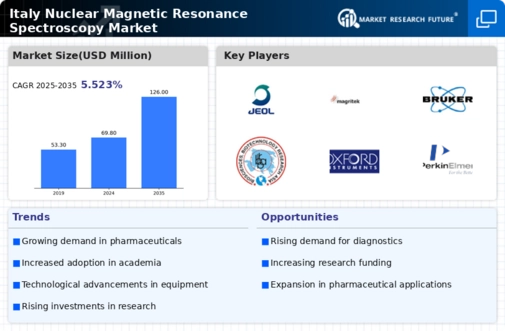Growing Focus on Environmental Monitoring
The nuclear magnetic-resonance-spectroscopy market is likely to benefit from the growing focus on environmental monitoring in Italy. As environmental regulations become more stringent, industries are compelled to adopt advanced analytical techniques to assess pollutants and contaminants. NMR spectroscopy offers a non-destructive method for analyzing complex environmental samples, making it an attractive option for researchers and regulatory bodies. In 2025, the Italian government is expected to allocate increased funding towards environmental protection initiatives, which may include the implementation of NMR technology for monitoring purposes. This shift towards sustainability and environmental responsibility could drive the demand for nuclear magnetic-resonance-spectroscopy, positioning it as a critical tool in addressing environmental challenges.
Rising Investment in Research and Development
The nuclear magnetic-resonance-spectroscopy market in Italy is experiencing a surge in investment directed towards research and development. This trend is primarily driven by the need for advanced analytical techniques in various sectors, including pharmaceuticals and food safety. In 2025, R&D expenditure in Italy is projected to reach approximately €30 billion, with a significant portion allocated to innovative technologies such as nuclear magnetic resonance (NMR) spectroscopy. This influx of funding is likely to enhance the capabilities of NMR systems, leading to improved resolution and sensitivity. Consequently, the market may witness an increase in the adoption of NMR spectroscopy across diverse applications, thereby bolstering its growth trajectory. Furthermore, collaboration between public and private sectors in Italy is expected to foster innovation, further propelling the nuclear magnetic-resonance-spectroscopy market forward.
Increasing Applications in Food and Beverage Industry
The nuclear magnetic-resonance-spectroscopy market is witnessing a notable expansion due to its increasing applications in the food and beverage industry in Italy. NMR spectroscopy is utilized for quality control, authenticity testing, and nutritional analysis of food products. As consumer awareness regarding food safety and quality rises, manufacturers are increasingly adopting NMR techniques to ensure compliance with stringent regulations. In 2025, the Italian food and beverage sector is anticipated to grow by approximately 4%, creating a favorable environment for the adoption of advanced analytical methods. This trend suggests that the nuclear magnetic-resonance-spectroscopy market will benefit from heightened demand for reliable testing methods, ultimately enhancing its market presence in Italy.
Technological Integration with Artificial Intelligence
The nuclear magnetic-resonance-spectroscopy market is likely to experience transformative changes through the integration of artificial intelligence (AI) technologies. AI can enhance data analysis and interpretation, making NMR spectroscopy more efficient and accessible. In Italy, the adoption of AI in scientific research is gaining momentum, with investments in AI technologies projected to reach €5 billion by 2025. This integration may streamline workflows and improve the accuracy of results in the nuclear magnetic-resonance-spectroscopy market. As researchers and industries seek to leverage AI capabilities, the demand for advanced NMR systems that incorporate these technologies is expected to rise, potentially reshaping the landscape of analytical chemistry in Italy.
Expansion of Educational Institutions and Training Programs
The nuclear magnetic-resonance-spectroscopy market is poised for growth due to the expansion of educational institutions and training programs in Italy. Universities and research centers are increasingly incorporating NMR spectroscopy into their curricula, thereby fostering a new generation of skilled professionals. This educational emphasis is crucial, as it ensures a steady supply of qualified personnel who can operate and innovate within the nuclear magnetic-resonance-spectroscopy market. In 2025, it is estimated that the number of graduates in relevant fields will increase by 10%, enhancing the workforce's capabilities. Consequently, this trend may lead to greater adoption of NMR technology across various sectors, further solidifying its role in scientific research and industrial applications.



















Leave a Comment